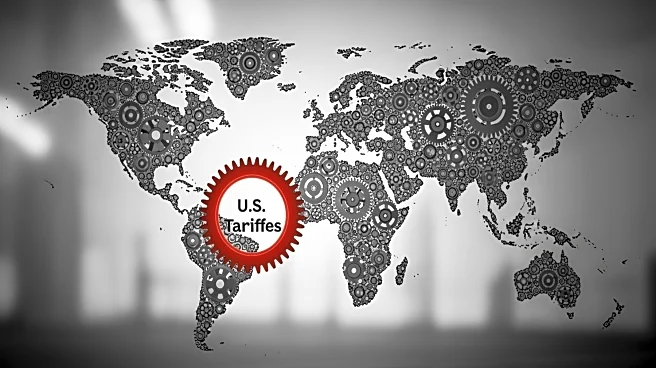What's Happening?
Global trade has shown unexpected resilience despite the imposition of high U.S. tariffs, according to the DHL Global Connectedness Tracker. The report, developed in collaboration with NYU Stern, indicates
that world trade expanded more rapidly in the first half of 2025 than in any comparable period since 2010, excluding the pandemic recovery phase. This analysis provides a comprehensive view of how international trade is adapting to new U.S. trade policies under President Trump's second term. The report is based on over 20 million data points from 25 sources, illustrating the ongoing evolution of globalization despite economic and political challenges. John Pearson, CEO of DHL Express, emphasized the persistent creativity of global buyers and sellers in overcoming trade barriers.
Why It's Important?
The findings of the DHL report underscore the adaptability and resilience of global trade networks in the face of significant tariff increases by the U.S. This resilience is crucial for maintaining international business relationships and economic stability. The ability of global trade to continue expanding despite these barriers suggests that businesses are finding innovative ways to navigate the complexities of international trade policies. This has implications for U.S. industries reliant on imports and exports, as well as for policymakers who must consider the broader impacts of trade restrictions on economic growth and international relations.
What's Next?
As global trade continues to adapt to U.S. tariff policies, businesses may increasingly seek alternative strategies to mitigate the impact of these barriers. This could involve diversifying supply chains, exploring new markets, or investing in technologies that enhance trade efficiency. Policymakers may also face pressure to reassess trade policies to balance protectionist measures with the need for economic growth and international cooperation. The ongoing evolution of trade dynamics will likely influence future negotiations and agreements between the U.S. and its trading partners.
Beyond the Headlines
The resilience of global trade amid tariff challenges highlights the broader implications for international economic cooperation and the role of innovation in overcoming policy barriers. This situation may prompt discussions on the ethical and strategic dimensions of trade policies, including their impact on global economic equity and sustainability. Long-term shifts in trade practices could emerge, influencing how countries approach economic diplomacy and international collaboration.









